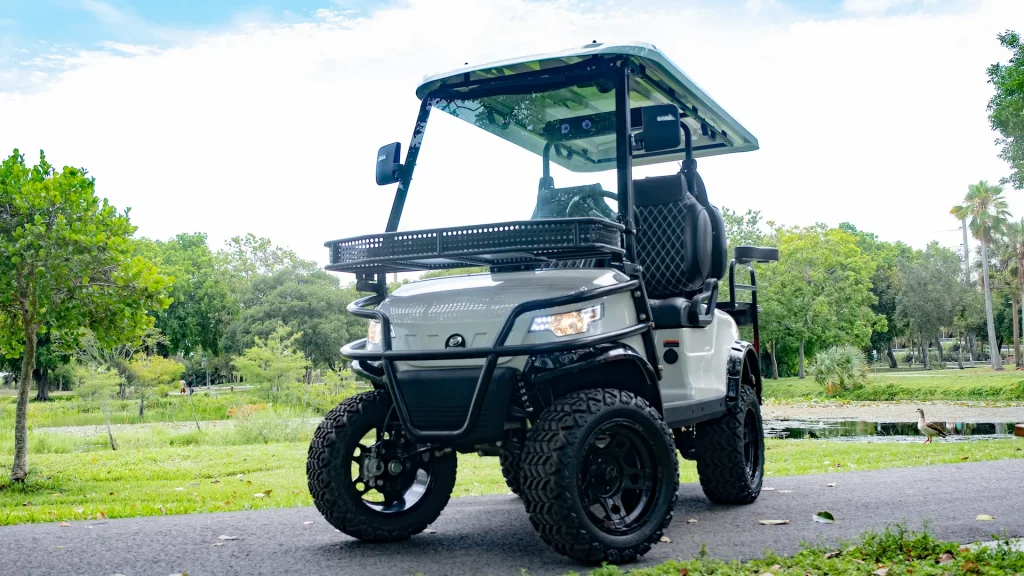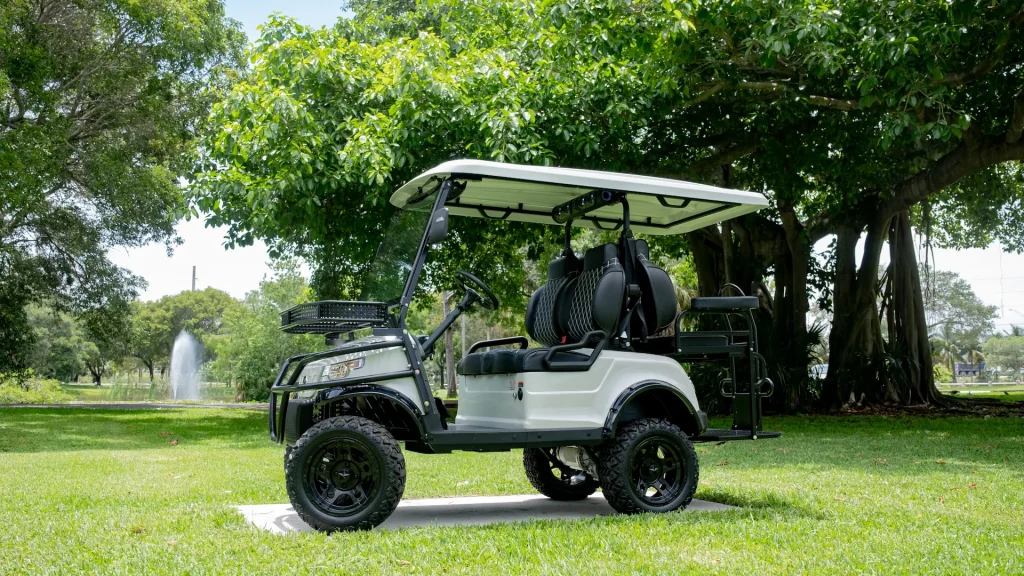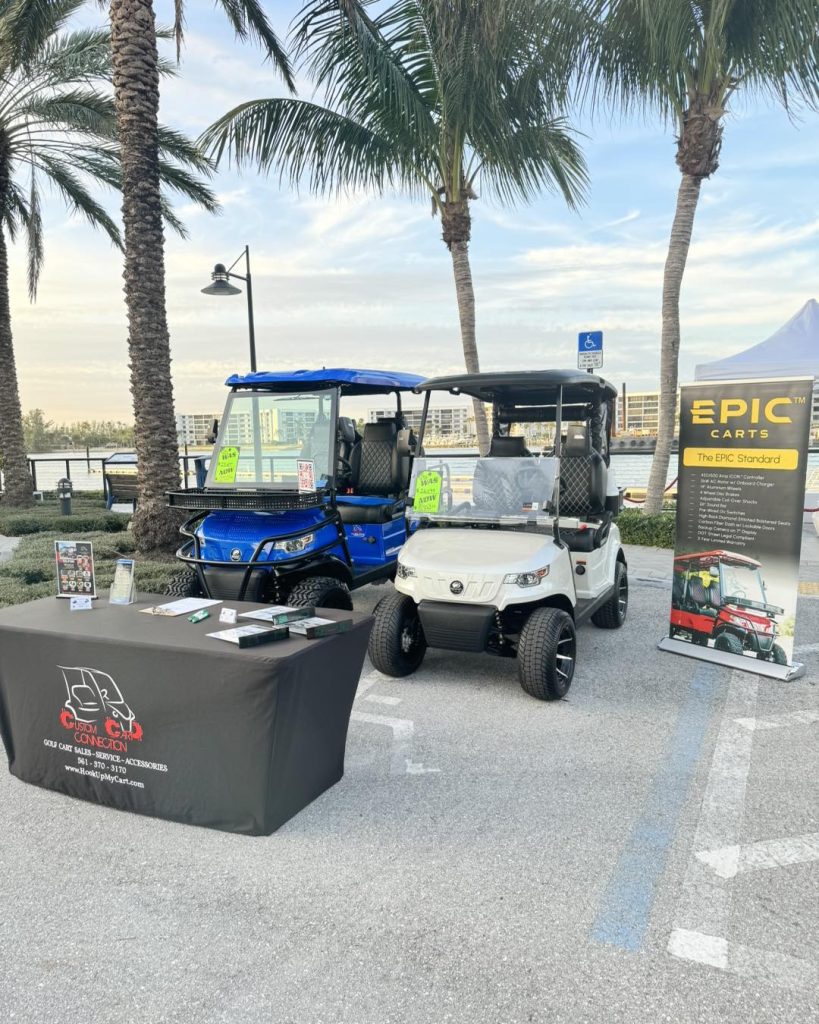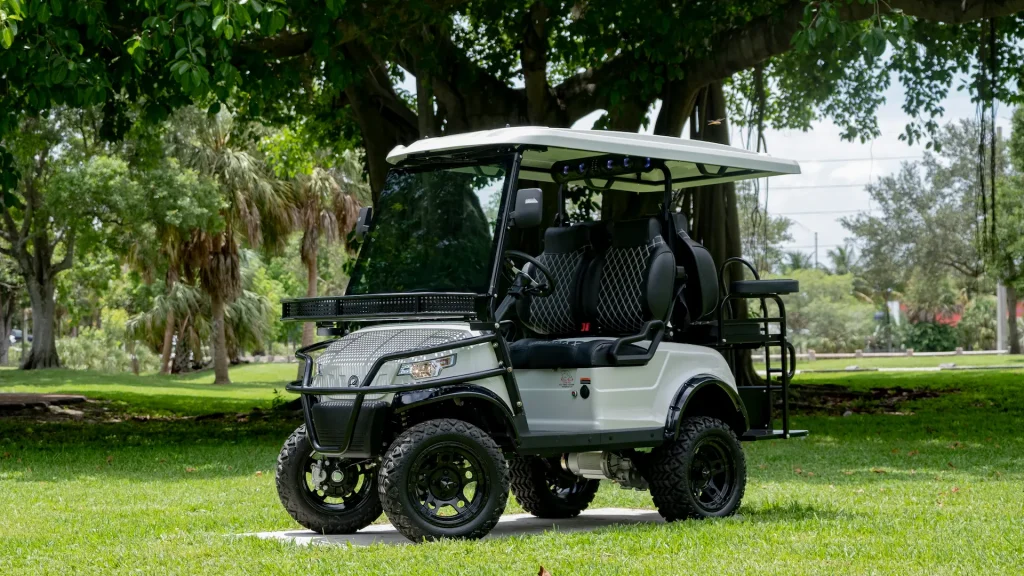Are Golf Carts Street Legal?
What you need to know about Street Legal Golf Carts In Florida.
Florida state law and municipal codes provide opportunities to drive your golf cart on local roads and neighborhood streets provided they meet certain criteria.
However, there are important distinctions between street-legal golf carts in Florida and the ones that are allowed on courses and multi-modal paths. Let’s take a deeper look into low-speed vehicles, what the golf cart laws in Florida say, and how you can obtain a new mode of travel with a custom street-legal golf cart.

Golf Cart Laws in Florida
In Florida, golf carts, like the ones available from Custom Cart Connection, are regulated by state law and local ordinances. According to Florida Highway Safety and Motor Vehicles, they make provisions for low-speed vehicles (LSVs), golf carts, and off-highway vehicles to be operated on public roads. There are different requirements for operating a low-speed vehicle than there are for operating a golf cart. Let’s take a look at how the state distinguishes between the two classes of vehicles.

Low-Speed Vehicles (LSVs)
Low-speed vehicles (LSVs) can only be operated on streets. The posted speed limit on the road must be 35mph or less. The maximum speed of a low-speed vehicle is greater than 20mph but can not exceed 25mph. Low-speed vehicles must also feature all of the following safety features and equipment:
- Headlamps
- Turn Signals (Both Front and Rear)
- Stop Lamps
- Tail Lamps
- Red Reflex Reflectors (On Each Side and On the Rear)
- Driver-Side Exterior Mirror
- Interior Rear-View Mirror (Or Exterior Mirror on Passenger Side)
- Parking Brake
- Windshield
- Seat Belts
- Vehicle Identification Number (VIN)
Golf Carts
Golf cart laws in Florida define them as “motor vehicles designed and manufactured for operation on a golf course that is not capable of exceeding 20mph.” Therefore, golf carts fall below the speed threshold set by low-speed vehicles. Golf carts that are not considered low-speed vehicles may be operated on roadways and multi-modal paths that are designated for golf carts.
How Local Ordinances Affect Golf Cart Laws in Florida
Local ordinances can affect golf cart laws in Florida by adding additional rules and regulations or modifying the existing ones. In Florida, golf cart laws are regulated by state law, but local governments can pass their own ordinances to regulate the use of golf carts within their jurisdiction.
For example, some cities or counties in Florida may require additional safety equipment beyond what is mandated by state law, such as additional lighting or a slow-moving vehicle emblem. Others may restrict the use of golf carts on certain roads or areas, or limit the number of passengers allowed.
Local ordinances can also affect the registration and operation of golf carts in their area. For instance, golf cart registration in Westlake, Florida may require a permit or registration for golf carts in addition to the registration requirements for LSV golf carts. They may impose fees or taxes for their use. Others, such as the golf cart guidelines in Wellington, Florida, may also limit the hours of operation or designate specific areas where golf carts can be driven.
It is important for golf cart and LSV golf cart owners to familiarize themselves with local ordinances in addition to state law, as they can vary depending on the location. It is recommended to check with the local government or law enforcement agency to determine the specific rules and regulations that apply to golf carts and LSV golf carts in a particular area.


What Is an LSV Golf Cart?
An LSV golf cart is a low-speed vehicle that, either through factory specification or aftermarket modification, is considered a street-legal golf cart in Florida.
LSV golf carts, such as Tomberlin, fall under the low-speed vehicle provisions as outlined by Florida Highway Safety and Motor Vehicles, which we have detailed above. Not all LSVs are golf carts, and not all golf carts are LSVs. However, it is possible to have custom street-legal golf carts that qualify as low-speed vehicles after modification and conversion.
The important thing to remember is that low-speed vehicles have required safety features and equipment, must be titled and registered, and require the driver of the vehicle to have a valid driver’s license (which means that the driver is 16 years of age or older).
By contrast, golf carts do not have such requirements and can be driven by persons as young as 14. However, they have lower maximum speeds, and fewer available roads they can drive on.
Get Custom Street-Legal Golf Carts Built Just For You
Custom Cart Connection offers both custom street-legal golf carts and modification services to turn your golf cart into an LSV golf cart.You can order a brand-new golf cart from some of the best manufacturers in the world like ICON, Tomberlin, and EPIC.
Don’t see what you want? Click on our Build A Cart link and tell us what you’re looking for.We’ll present you with a list of options and go over all of the possibilities that we can provide. Contact Custom Cart Connection for a custom street-legal golf cart or LSV golf cart today!
